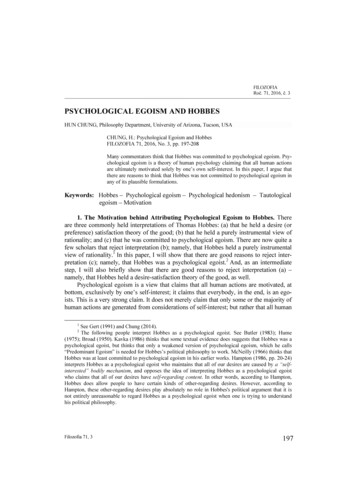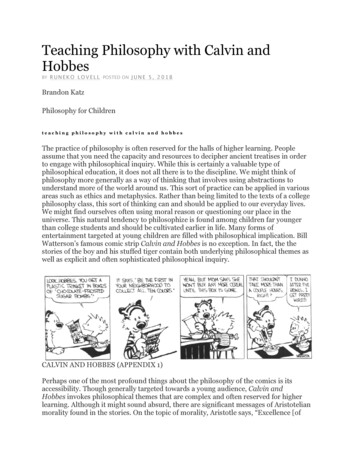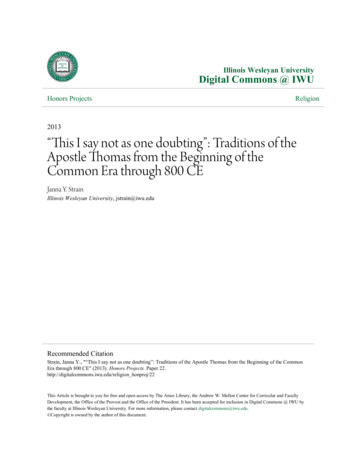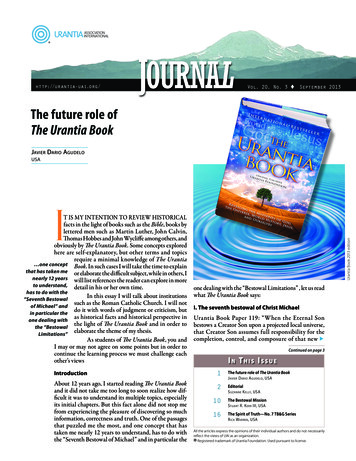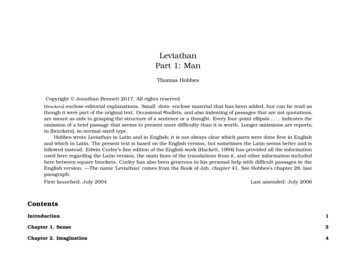
Transcription
Hobbes Studies 26 (2013) 130–151brill.com/hobsThomas Hobbes:Magnanimity, Felicity, and Justice*Andrew J. CorsaVisiting Assistant Professor, Kutztown University315 Old MainKutztown UniversityKutztown PA 19530E-mail: AndrewCorsa@gmail.comAbstractThomas Hobbes’s concept of magnanimity, a descendant of Aristotle’s “greatness of soul,”plays a key role in Hobbes’s theory with respect to felicity and the virtue of justice. In hisCritique du ‘De Mundo’, Hobbes implies that only genuinely magnanimous people canachieve the greatest felicity in their lives. A life of felicity is a life of pleasure, where the onlypleasure that counts is the well grounded glory experienced by those who are magnanimous. Hobbes suggests that felicity involves the successful pursuit of desires, a pursuit atwhich the magnanimous are particularly adept. Additionally, Hobbes implies that thosewho possess the virtue of justice must also possess magnanimity; it is the just person’s“Nobleness or Gallantnesse of courage, (rarely found).” Leo Strauss and Dorothea Krook suggest that this cannot be Hobbes’s “final word” on justice, because, they say, Hobbes considersmagnanimity a type of pride, which he derogates and cannot consistently associate withvirtue. I argue that magnanimity, associated with well-grounded glory, is not a type of pride;only vain glory is.KeywordsMagnanimity; Justice; Happiness; Glory***While Hobbes’s concept of magnanimity is historically linked to Aristotle’s“greatness-of-soul” or megalopsuchia, Hobbes’s approach is unique. I arguethat the passion of magnanimity plays a key role in Hobbes’s theory with* I am indebted to many insightful conversations with José A. Benardete. I am alsoindebted to the exceptional feedback of Charles Richard Booher, Eric Schliesser, and myanonymous referee. I would also like to thank the organizers and participants of the UpstateNew York Early Workshop on Early Modern Philosophy, where I presented an early draft. Koninklijke Brill NV, Leiden, 2013 DOI 10.1163/18750257-02602003
A.J. Corsa / Hobbes Studies 26 (2013) 130–151 131respect to felicity and the virtue of justice. According to Hobbes, only agenuinely magnanimous person could achieve the greatest degree of felicity, or happiness, possible during life. Further, Hobbes suggests that thosewho are entirely just, who fully possess the virtue of justice, must be magnanimous as well.I begin by describing and discussing Hobbes’s notion of magnanimity.Focusing on Hobbes’s definitions of “magnanimity,” “glory,” and “contempt,”I argue that magnanimous people have two key features: (1) they have anaccurate understanding of their own great power to achieve their ends, andthey take joy in this, and (2) they consistently desire and pursue thosemeans that are most helpful for achieving their ends.I focus on the importance of magnanimity with respect to justice andfelicity. Previous scholars have dramatically underestimated or misunderstood its significance to Hobbes’s philosophy. M. M. Goldsmith argues, forinstance, that the pattern of life of magnanimous people is, by its nature,less pleasurable than others,1 and he implies that there might be otherroutes to felicity (happiness). In contrast, I argue that, according to Hobbes,only a genuinely magnanimous person experiences the kind and quantityof pleasure necessary for great felicity. For Hobbes, if a person is to becomethe happiest he can be, he must also become magnanimous.José A. Benardete, who offers the best and most comprehensive discussion of Hobbes’s notion of magnanimity to date, falls short of acknowledging the role that magnanimity plays in Hobbes’s theory for those who aretruly just and virtuous.2 Benardete is correct that magnanimous peoplewould naturally contemn small, petty injustices (like pickpocketing), butI further argue that magnanimity drives those who are truly just and virtuous to contemn all injustices. I suggest that only a magnanimous personcould be fully just and virtuous.Leo Strauss and Dorothea Krook acknowledge that Hobbes sometimesseems to treat the passion of magnanimity as if it were the origin of the virtue of justice.3 Both authors suggest that we ought not ultimately attribute1 M. M. Goldsmith, Hobbes’s Science of Politics (New York: Columbia University Press,1966), 79-83.2 José A. Benardete, Greatness of Soul in Hume, Aristotle, and Hobbes, (manuscript, 2011).(His completed book is now forthcoming: José A. Benardete, Greatness of Soul: In Hume,Aristotle and Hobbes, as Shadowed by Milton’s Satan (Newcastle, UK: Cambridge ScholarsPublishing, forthcoming [2013]).3 Leo Strauss, The Political Philosophy of Hobbes, Its Basis and Its Genesis, Trans. Elsa M.Sinclair (Chicago: University of Chicago Press, 1963), 51, 54, 24-25; Dorothea Krook, ThreeTraditions of Moral Thought (Cambridge: University Press, 1959), 129-130.
132A.J. Corsa / Hobbes Studies 26 (2013) 130–151 this view to Hobbes, because, they say, Hobbes considers magnanimity atype of pride,4 which he attacks, and thus cannot consistently associatewith virtue.5 In contrast, I maintain that magnanimity is not a type of pride,and that Hobbes can wholeheartedly, and without issue, embrace magnanimity as the source of, and necessary condition for, the virtue of justice.I. MagnanimityBefore considering the relations between magnanimity and felicity, I examine them individually. In The Elements of Law: Natural and Politic, Hobbesprovides the following definition for “magnanimity”: “Magnanimity is nomore than glory, of which I have spoken in the first section; but glory wellgrounded upon certain experience of power sufficient to attain his end inopen manner.”6In order properly to understand this definition, we turn to his definitionof “glory” in The Elements of Law:Glory, or internal gloriation or triumph of the mind, is that passion which proceedeth from the imagination or conception of our own power, above thepower of him that contendeth with us This imagination of our power andworth, may be an assured and certain experience of our own actions, and thenis that glorying just and well grounded Farther, the fiction (which also isimagination) of actions done by ourselves, which never were done, is glorying;but because it begetteth no appetite nor endeavor to any further attempt, it ismerely vain and unprofitable And this is called VAIN GLORY.7Here, as in Leviathan,8 Hobbes distinguishes well-grounded glory from vainglory. Both kinds of glory arise when a person imagines his own power. Buteach kind of glory matches up to a different kind of imagination.According to Hobbes, imagination is called “compounded” when a person“imagines himselfe a Hercules, or an Alexander,”9 or imagines himself “to belike unto some other man whose acts he admireth.”10 Vain glory, which is4 Krook, Three Traditions, 130. Strauss, The Political Philosophy, 51 and 25.5 Krook, Three Traditions, 130-131. Strauss, The Political Philosophy, 55 and 25.6 Thomas Hobbes, The Elements of Law: Natural & Politic, ed. Ferdinand Tonnies(Cambridge: University Press, 1928), I.9.20, 35-36.7 Hobbes, The Elements of Law I.9.1, 28.8 Thomas Hobbes, Leviathan, Revised Student Edition, ed. Richard Tuck (Cambridge:Cambridge University Press, 1996), I.6, 26-27.9 Hobbes, Leviathan, I.2, 5-6.10 Hobbes, The Elements of Law, I.9.1, 28.
A.J. Corsa / Hobbes Studies 26 (2013) 130–151 133likewise based on fiction, is associated with compounded imagination, andvainglorious people have an inaccurate representation of their own power.In contrast, for Hobbes, imagination can also be “simple” and expresssomething as it actually is, as “imagination and memory, are but one thing.”11Simple imagination does not involve fiction, and a person’s glory is wellgrounded provided that his conception of his power is accurate. His simpleimagination of his power is “an assured and certain experience of [his] ownactions.”12Magnanimity is nothing more than well grounded glory; the magnanimous person has an accurate representation of his own power, and he takesjoy in it. His well-grounded glory proceeds from an imagination of power“above the power of him that contendeth with us.”13 Since the magnanimous person’s conception of his power is accurate, the magnanimous person is genuinely more powerful than his competitors.Hobbes’s notion of magnanimity has its historical origins in Aristotle’s“greatness-of-soul,” or megalopsuchia, described in the NichomacheanEthics,14 and later called “magnanimitas” by Aquinas and translated as“magnanimity.”15 Aristotle, too, emphasizes that the magnanimous personhas an accurate representation of his substantial power; he “thinks himself,and is, worthy of great things.”16 Both Aristotle and Hobbes similarly contrast the magnanimous person both with “conceited” or “vainglorious” menwho think themselves more worthy or powerful than they actually are, andwith people who judge themselves overly weak.1711 Hobbes, Leviathan, I.2, 5.12 Hobbes, The Elements of Law, I.9.1, 28.13 Hobbes, The Elements of Law, I.9.1, 28.14 Aristotle, Nichomachean Ethics, Trans. Christopher Rowe, (Oxford: Oxford UniversityPress, 2002), IV.3, 148-151.15 S. Thomas Aquinas, St Thomas Aquinas, Summa Theologicae, Volume 42, Courage, trans.Anthony Ross O.P. and P. G. Walsh (London: Blackfriars in conjunction with McGraw-HillBook Company and Eyre & Spottiswoode, 1966), II-II, Q. 129, pp. 96-126.16 Aristotle, Nichomachean Ethics, IV.3, 1123b2-3, 148.17 Aristotle, Nichomachean Ethics, IV.3, 1123b5-b10, 148. Hobbes, The Elements of Law, I.9.12, 28-29. Hobbes writes that those who judge themselves worse than they are experience“vain fear” (I.9.2, 29), while Aristotle claims they are “small-souled” or “pusillanimous” (b910). While Hobbes also contrasts magnanimity with pusillanimity (Hobbes, Leviathan, I.6,26), he treats pusillanimity differently from Aristotle, as a passion belonging to vaingloriousindividuals who believe themselves to be more powerful than they are. Hobbes is clear aboutthis in The Elements of Law (I.9.20, 36); my discussion of laughter, below, implies that italso holds in Leviathan. For more on the relation between Hobbes’s and Aristotle’s accounts,and on the relation between pusillanimity and magnanimity: Benardete, Greatness of Soul,(manuscript).
134A.J. Corsa / Hobbes Studies 26 (2013) 130–151 Scholars note that Aristotle’s discussion of “greatness-of-soul” belongs tothe same philosophical tradition as more recent discussions of self-respectand self-esteem.18 Hobbes’s discussion of magnanimity belongs to this tradition as well. His notion of magnanimity seems particularly similar to thewarranted self-esteem popularized by recent psychologists such as MartinSeligman, who focus on the value of cultivating esteem that is grounded inachievements and merit, rather than false praise.19In Leviathan, although Hobbes offers a very different definition of magnanimity, to which I return momentarily, he is nonetheless clear that anyone who is magnanimous experiences well grounded glory, or warrantedself-esteem. Consider, for example, Leviathan’s discussion of laughter:Sudden Glory, is the passion which maketh those Grimaces called LAUGHTER;and is caused either by some sudden act of their own, that pleaseth them; orby the apprehension of some deformed thing in another, by comparisonwhereof they suddenly applaud themselves. And it is incident most to them,that are conscious of the fewest abilities in themselves; who are forced to keepthemselves in their own favour, by observing the imperfections of other men.And therefore much Laughter at the defects of others, is a signe of Pusillanimity.For of great minds, one of the proper works is, to help and free others fromscorn; and compare themselves onely with the most able.20As Benardete acknowledges, this passage picks up on the distinctionbetween well-grounded glory and vain glory, which Hobbes had drawnmoments before.21 Those who experience well-grounded glory laugh “bysome sudden act of their own, that pleaseth them,” while those who experience vain glory laugh “by the apprehension of some deformed thing inanother.” The passage implies that pusillanimous, small-minded individuals experience vain glory and deformed laughter, while great-minded, magnanimous people don’t. Magnanimous people – those who have greatminds and help free others from scorn – only experience well groundedglory and good laughter.2218 For example: Robin S. Dillon, “Introduction,” in Dignity, Character, and Self-Respect, ed.Robin S. Dillon (New York: Routledge, 1995).19 Martin E.P. Seligman, “Positive Psychology,” in The Science of Optimism and Hope:Research Essays in Honor of Martin E.P. Seligman, ed. Jane E. Gillham (Radnor, PA: TempletonFoundation Press, 2000), particularly p. 422.20 Hobbes, Leviathan, I.6, 27.21 Benardete, Greatness of Soul, (manuscript). Hobbes, Leviathan, I.6, 27.22 In The Elements of Law, Hobbes is even clearer that “bad” laughter is a sign of bothpusillanimity and vain glory (Hobbes, The Elements of Law, I.9.20, 36).
A.J. Corsa / Hobbes Studies 26 (2013) 130–151 135Still, Leviathan expands on the notion of magnanimity with its new definition: “Contempt of little helps, and hindrances.”23 To understand whatthis means, we consider Hobbes’s definition of “contempt”:Those things which we neither Desire, nor Hate, we are said to Contemne:CONTEMPT being nothing else but an immobility, or contumacy of theheart that is already moved otherwise by other more potent objects.24By definition, if a person contemns something, he neither desires nor hatesit; he is neutral toward it. So the magnanimous person who contemns littlehelps and hindrances neither desires nor hates them. He neither desiresnor hates anything that does little significantly to help or hinder his goals.25Hobbes is clear that a person cannot perform a voluntary act that doesn’tproceed from his desires.26 Acting voluntarily, a person can only ever pursue something if he desires it. So, a magnanimous person never voluntarilypursues anything that will help him only a little in comparison to otherthings. He consistently pursues the best means to his ends.Hobbes recognizes that his two definitions of “magnanimity” fit together.He implies that an individual must have “glory well-grounded upon certainexperience of power”27 in order to consistently experience “[c]ontempt oflittle helps, and hindrances.”28 Only individuals who have an accurate representation of their own power consistently contemn little helps and hindrances. If a person has too high an opinion of his own power, he will desireand pursue goals that he can’t possibly achieve, or he will retreat from trouble, not actually competent to proceed.29 Likewise, if a person has too lowan opinion of his power, he will be utterly cowed, and fail to pursue goalsthat are within his reach.30 Instead, he will desire and pursue lesser things.Only a magnanimous person – who has an accurate representation of his23 Hobbes, Leviathan, I.6, 26.24 Hobbes, Leviathan, I.6, 24.25 My discussion of contempt is indebted to Benardete’s fairly different account of thenotion: Benardete, Greatness of Soul, (manuscript).26 Bernard Gert acknowledges this; for Hobbes, a voluntary act proceeds from the will,and the will is nothing more than a desire. Bernard Gert, “Hobbes and Psychological Egoism,”Journal of the History of Ideas 28 (1967): 507. In his discussion, Gert cites: Hobbes, Leviathan,I.6, 28.27 Hobbes, The Elements of Law, I.9.20, 35-36.28 Hobbes, Leviathan, I.6, 26. When unnoted, all italicizations in quotations are original.29 See the lengthy discussion of empty glory in the third section of this paper and thequotations, there, from Hobbes’s Critique du ‘De Mundo.’ Also: Hobbes, Leviathan I.11, 49.30 Hobbes, The Elements of Law, I.9.2, 29.
136A.J. Corsa / Hobbes Studies 26 (2013) 130–151 own power – consistently and reliably contemns little helps and hindrances, and consistently desires and pursues the best means to his ends.31Given the strong role that pleasure plays in Hobbes’s theory of humanmotivation,32 there is further reason to think that an individual who takesjoy, a type of pleasure,33 in his own power and ability is more likely to effectively pursue his goals than an individual who doesn’t. So, too, I imagine hewould be less likely to become distracted by trifles, or to give up because ofminor obstacles; he will contemn little helps and hindrances.It is valuable to consider further Hobbes’s contention that magnanimous,great-minded individuals “help and free others from scorn; and comparethemselves onely with the most able.”34 First, seeing that magnanimousindividuals neither contemn, nor voluntarily pursue, little helps and hindrances, to “free others from scorn” must be neither. Freeing others fromscorn must contribute substantially to their goals. That this is the case willbe better understood later, in our discussion of justice and the role it playsin relation to magnanimity and felicity.35 Second, Hobbes suggests thatmagnanimous people only compare themselves with those who are “mostable.” The magnanimous person not only has an accurate sense of his ownpower above his competitors, he also belongs to and judges himself againsta small minority, those who are “most able.” That is, he compares himselfagainst other individuals who easily perform tasks that the majority of31 David Hume makes a similar point about his own admittedly very different conceptionof the magnanimous man. In his Treatise on Human Nature, Hume equates “steady and wellestablish’d pride and self-esteem” with that which “we call heroic virtue, and admire underthe character of greatness and elevation of mind” (T 3.3.2.13; SBN 599). Hume writes:“Nothing is more useful to us in the conduct of life, than a due degree of pride, which makesus sensible of our own merit, and gives us a confidence and assurance in all our projects andenterprizes. Whatever capacity any one may be endow’d with, ‘tis entirely useless to him, ifhe be not acquainted with it, and form not designs suitable to it” (T 3.3.2.8; SBN 596-7).(David Hume, A Treatise of Human Nature (abbreviated T), ed. David Fate Norton and MaryJ. Norton (Oxford: Oxford University Press, 2000), with page references to the second SelbyBigge edition, as revised by P.H. Nidditch (Oxford: Clarendon Press, 1978).32 For example, Hobbes, The Elements of Law, I.7.2, 22. Also see the excellent discussionsby S. V. Kitanov and F.S. McNeilly: S.V. Kitanov, “Happiness in a Mechanistic Universe:Thomas Hobbes on the Nature and Attainability of Happiness,” Hobbes Studies 24 (2011):117-136; F.S. McNeilly, “Egoism in Hobbes,” The Philosophical Quarterly 16.64 (1966): 193-206.A lengthier discussion of the role of pleasure in motivation is out of the scope of this currentpaper.33 Hobbes, Leviathan, I.6, 25.34 Hobbes, Leviathan, I.6, 27.35 Also see Footnote 114, for a rough sketch of another argument, concerning “freeingothers from scorn.”
A.J. Corsa / Hobbes Studies 26 (2013) 130–151 137people consider great.36 The magnanimous person is powerful, not only incomparison to “him that contendeth with us,”37 but also in comparison tothe great majority of people.II. FelicityBefore considering the connections between magnanimity and felicity,I examine felicity on its own. In Leviathan, Hobbes defines the term “felicity” twice, in two different chapters:Continuall successe in obtaining those things which a man from time to timedesireth, that is to say, continuall prospering, is that men call FELICITY; I meanthe Felicity of this life.38Felicity is a continuall progresse of the desire, from one object to another;the attaining of the former, being still but the way to the later. The causewhereof is, That the object of mans desire, is not to enjoy once onely, and forone instant of time; but to assure for ever, the way of his future desire.39In his Critique du ‘De Mundo’ De Thomas White, Hobbes writes that “Felicityconsists in the progress of the appetite from a good thing acquired toanother good thing yet to be acquired.”40 Recognizing that, for Hobbes,something is only good for a person if the person desires it,41 this definitionamounts to Hobbes’s claim in Leviathan that felicity is “[c]ontinuall successe in obtaining those things which a man from time to time desireth.”4236 Hobbes writes that, for someone who suffers from pusillanimity, which is the contraryof magnanimity, “that seems great to him, which other men think a trifle” (Hobbes,Leviathan, I.8, 33). Benardete, too, treats pusillanimity as the contrary of magnanimity(Benardete, Greatness of Soul, [manuscript]).37 Hobbes, Elements of Law, I.9.1, 28.38 Hobbes, Leviathan, I.6, 29.39 Hobbes, Leviathan,, I.11, 47.40 “Consistit ergo foelicitas in progressu appetitûs à bono acquisito ad aliud bonum acquirendum” (Thomas Hobbes, Critique Du ‘De Mundo’ De Thomas White, Introduction, TexteCritique Et Notes Par Jean Jacquot et Harold Whitmore Jones (Paris: Librairie Philosophiquede J. Vrin, 1973), XXXVIII.6, 416.) Thomas Hobbes, Thomas White’s ‘De Mundo’ Examined,trans. Harold Whitmore Jones (London: Bradford University Press, 1976), XXXVIII.6, 464465. While my translations of Critique Du ‘De Mundo’ were heavily influenced by those ofJones, they differ from his translations in numerous important respects. For several notes onmy translations, and how they differ from Jones, please see my website: .html.41 For example, Hobbes, Leviathan, I.6, 23-24.42 Hobbes, Leviathan, I.6, 29. Note that Hobbes’s wording, in Critique Du ‘De Mundo’, issimilar to that of his Latin Leviathan. In Leviathan, he defines felicity as: “Felicitas progressus
138A.J. Corsa / Hobbes Studies 26 (2013) 130–151 Individuals achieve felicity when they continually and successfully achievewhat they desire or, in other words, continually obtain what is good (without losing what they already have.)43According to Hobbes, everyone pursues a life of felicity. Immediatelyafter defining “felicity” in Leviathan, Hobbes writes that, “The voluntaryactions, and inclinations of all men, tend, not onely to the procuring, butalso the assuring of a contented life; and differ onely in the way.”44 Everyperson possesses desires and wants to satisfy them and achieve contentment. Everyone desires felicity – the continual success in obtaining what isdesired.45In The Elements of Law, Hobbes again implies that felicity is a commongood. He compares a person’s life to a race, and says that this race has “noother goal, nor other garland, but being foremost.”46 Keeping with this analogy, Hobbes claims that: “Continually to out-go the next before, is felicity.”47Everyone wants to be a constant winner; each and every person desiresfelicity.Similarly, Hobbes implies that felicity is a common good when, in Chapter11 of Leviathan, he moves directly from a discussion of felicity to a discussion of power, writing: “I put for a generall inclination of all mankind, aperpetuall and restlesse desire of Power after power, that ceaseth onely inDeath.”48 According to Hobbes, everyone desires power because everyonedesires felicity, and felicity and power are strongly linked.Hobbes is clear about this in his Critique du ‘De Mundo’, writing:And so in order to gain felicity, the hope of acquiring should be joined with thehope of conserving, and as a consequence felicity consists in the progress ofperpetuus est ab una cupiditate ad alteram” (Thomas Hobbes, Opera Philosophica QuaeLatine Scripsit Omnia [Londini: Apud Joannem Bohn, 1841; Aalen: Scientia Verlag 2ndprint, 1966], I.11, 77.) In other words, felicitas/felicity is the progressus/progress of the desirefrom one object to another. In Critique du ‘De Mundo’, he similarly writes that foelicitas/felicity consists in-progressu/in-the-progress of the appetite from a good thing acquired toanother yet to be acquired.43 Hobbes, Leviathan, I.11, 47. Hobbes, Critique Du ‘De Mundo’, XXXVIII.6, 416.44 Hobbes, Leviathan, I.11, 47.45 Donald Rutherford arrives at a similar conclusion about the common desire for felicitywithout appealing to passages from The Elements or Critique Du ‘De Mundo’: DonaldRutherford, “In Pursuit of Happiness: Hobbes’s New Science of Ethics,” Philosophical Topics31.1&2 (2003): 381-383.46 Hobbes, The Elements of Law, I.9.21, 36. For more on the relation between the notion ofbeing “foremost” and Hobbes’s discussions of felicity, see my discussion of the relationbetween power and felicity in section III.47 Hobbes, The Elements of Law, I.9.21, 37.48 Hobbes, Leviathan, I.11, 47.
A.J. Corsa / Hobbes Studies 26 (2013) 130–151 139acquiring such that newly acquired things seem to conduce to holding fast theold. And since not only to acquire, but to also to hold fast to things producedare both powers, felicity is the progress of the appetite and hope from a lesserpower to a greater power.49A few sentences later, Hobbes similarly writes: “Felicity is the pleasure perceived in the continual and peaceful progress of the appetite from onepower to another.”50 In both passages, Hobbes identifies felicity with eitherthe progress of the appetite from one power to another, or the pleasureperceived in such a progress.According to Hobbes, “the POWER of a Man is his present means, toobtain some future apparent Good.”51 Further, Hobbes suggests that everygood we achieve, or desire we satisfy, is a means to our future ends. Whatwe achieve one day can be used as a tool to achieve what we want in thenext. Hobbes writes: “One success is the cause of another, because of thenew power paired with every success.”52 Each good we attain is a means toacquire future goods, and the attaining of a former desire is “but the way tothe latter.”53 Given Hobbes’s definition of “power,” this means that eachgood we attain and desire we satisfy is a power. Felicity – the pursuit ofgood and desire satisfaction – either is, or is closely tied to, the pursuit ofpower. And just as Hobbes maintains that every person desires a progressof the appetite from power to power, so everyone also desires felicity, aprogress of the appetite from one desire to the next.Not only is felicity a common good, but it is also that which we pursue inall of our actions. As already acknowledged, Hobbes suggests that the “voluntary actions” of all men tend to “the assuring of a contented life”54 offelicity. This squares with Hobbes’s assertion that “of all Voluntary Acts, the49 “Oportet itaque ad foelicitatem, coniunctam esse cum spe acquirendi spem conservandi;& per consequens foelicitatem consistere in progressu tali acquirendi, ut nova acquisitaconducere videantur ad tuenda vetera. Et quoniam non modò acquirere, sed parta tueripotentiae sunt, erit foelicitas progressus appetitûs & spei à potentia minore ad maiorem perpetuus” (Hobbes, Critique Du ‘De Mundo’, XXXVIII.6, 416). Jones, Thomas White’s, XXXVIII.6,465.50 “Foelicitas, iucunditas percepta ex continuato & placido progressu appetitionis à potentia ad potentiam ulteriorem” (Hobbes, Critique Du ‘De Mundo’, XXXVIII.6, 416). Jones, ThomasWhite’s, XXXVIII.6, 465.51 Hobbes, Leviathan, I.10, 41.52 “Unus autem successus causa est alterius, propter novam potentiam omni successu comparatam” (Hobbes, Critique Du ‘De Mundo’, XXXVIII.7, 417). Jones, Thomas White’s, XXXVIII.7,466.53 Hobbes, Leviathan, I.11, 47.54 Hobbes, Leviathan, I.11, 47.
140A.J. Corsa / Hobbes Studies 26 (2013) 130–151 Object is to every man his own Good.”55 After all, in Critique Du ‘De Mundo’,Hobbes claims that the pursuit of felicity is the pursuit of good.56 All of ourvoluntary actions aim for the good, what we desire, and we cannot help butstrive for felicity.In De homine, Hobbes suggests that we cannot achieve, in our lives, the“greatest good, or as it is called, felicity and the final end.”57 But Hobbesdoes not claim that we cannot experience some substantial degree of felicity during our lives; nor does he say that we do not desire great happiness orpursue it. In fact, Hobbes explicitly acknowledges that we can, in fact, experience “[f]elicity of this life.”58Hobbes argues against what some previous philosophers have said aboutfelicity, claiming “there is no such Finis ultimus, (ultimate ayme), norSummum Bonum, (greatest Good), as is spoken of in the Books of old MorallPhilosophers.”59 Hobbes denies that felicity of this life is “perpetuallTranquility of mind,”60 in which we cease to desire or fear anything.61 ButHobbes nonetheless maintains that we can still experience “[f]elicity ofthis life.” The felicity which we all strongly desire, and tend to in all ouractions, consists in a “restless desire of Power after power”62 and a continual success in achieving what we want.63As Phillip Mitsis acknowledges, Hobbes’s objections to the “old MorallPhilosophers” resemble earlier objections to philosophers like Epicurus,who maintained that happiness is ataraxia, or tranquility.64 The Cyrenaicsalso argued that it is human nature to relentlessly pursue desire after desire,55 Hobbes, Leviathan, I.15, 75.56 Hobbes, Critique Du ‘De Mundo’, XXXVIII.6, 41657 Thomas Hobbes, “On Man,” in Man and Citizen (De Homine and De Cive), trans. CharlesT. Wood, T. S. K. Scott-Craig, and Bernard Gert (Indianpolis: Hackett Publishing Company,1998), 11.15, 53. In Latin: “Summum bonum, sive ut vocatur, felicitas et finis ultimus, in praesentevita reperiri non potest” (Thomas Hobbes, “De Homine,” in Opera Philosophica Quae LatineScripsit Omnia Vol. II., ed. Gulielmi Molesworth (London: Apud Joannem Bohn, 1839),11.15, 103.)58 Hobbes, Leviathan, I.6, 29. Hobbes, Critique Du ‘De Mundo’, XVIII.4, 416. Jones, ThomasWhite’s, XVIII.4, 463.59 Hobbes, Leviathan, I.11, 47.60 Ibid., I.6, 29.61 “There would be nothing to long for, nothing to desire” (Hobbes, “On Man,” 11.15, 53;Hobbes, De Homine, 11.15, 103). Hobbes, Leviathan, I.6, 29.62 Hobbes, Leviathan, I.6, 29.63 For a related argument, see Rutherford, “In Pursuit,” 380-381.64 Phillip Mitsis
"greatness-of-soul" or . megalopsuchia, Hobbes's approach is unique. I argue that the passion of magnanimity plays a key role in Hobbes's theory with * I am indebted to many insightful conversations with José A. Benardete. I am also . indebted to the exceptional feedback of Charles Richard Booher, Eric Schliesser, and my anonymous referee.
